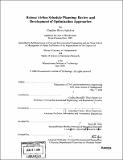Robust airline schedule planning : review and development of optimization approaches
Author(s)
Agbokou, Claudine Biova, 1979-
DownloadFull printable version (6.302Mb)
Other Contributors
Massachusetts Institute of Technology. Operations Research Center.
Advisor
Cynthia Barnhart and John-Paul Clarke.
Terms of use
Metadata
Show full item recordAbstract
Major airlines aim to generate schedules that maximize profit potential and satisfy constraints involving flight schedule design, fleet assignment, aircraft maintenance routing and crew scheduling. Almost all aircraft and crew schedule optimization models assume that flights, aircraft, crews, and passengers operate as planned. Thus, airlines typically construct plans that maximize revenue or minimize cost based on the assumption that every flight departs and arrives as planned. Because flight delays and cancellations result from numerous causes, including severe weather conditions, unexpected aircraft and crew failures, and congestion at the airport and in the airspace, this deterministic, optimistic scenario rarely, if ever, occurs. In fact, schedule plans are frequently disrupted and airlines often incur significant costs in addition to those originally planned. To address this issue, an approach is to design schedules that are robust to schedule disruptions and attempt to minimize realized, and not planned, costs. In this research, we review recovery approaches and robustness criteria in the context of airline schedule planning. We suggest new approaches for designing fleet assignments that facilitate recovery operations, and we present models to generate plans that allow for more robust crew operations, based on the idea of critical crew connections. We also examine the impact on robustness of new scheduling practices to debank hub airports.
Description
Thesis (S.M.)--Massachusetts Institute of Technology, Dept. of Civil and Environmental Engineering; and, (S.M.)--Massachusetts Institute of Technology, Operations Research Center, 2004. Includes bibliographical references (p. 87-89).
Date issued
2004Department
Massachusetts Institute of Technology. Department of Civil and Environmental Engineering; Massachusetts Institute of Technology. Operations Research CenterPublisher
Massachusetts Institute of Technology
Keywords
Civil and Environmental Engineering., Operations Research Center.